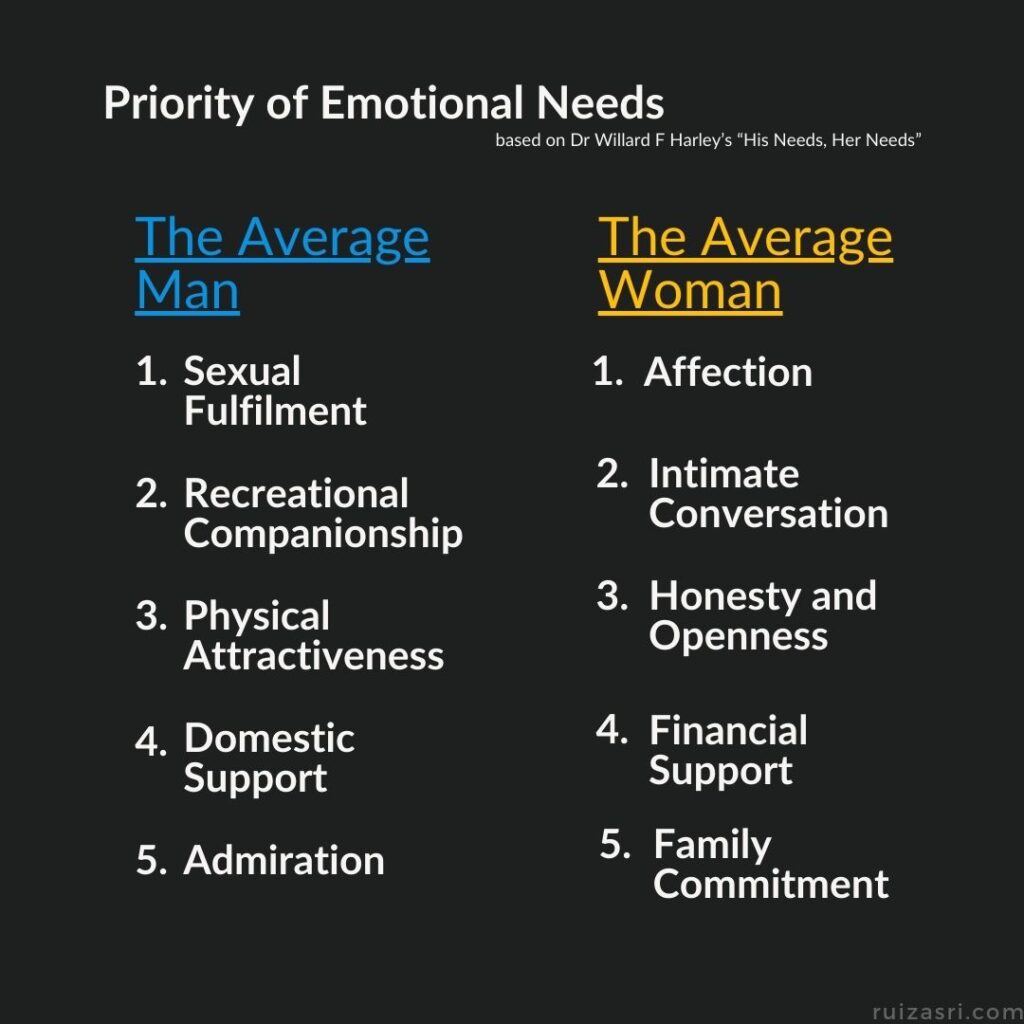The mature person no longer avoids their immaturity, but embraces it.
Maturing, especially for the most rational amongst us, means accepting the fact that you are an emotional being.
But what does it mean to be an emotional being?
An emotional being has emotional needs; and hence needs to sustainably find ways to fulfil those emotional needs.
What is an Emotional Need?
An emotional need is something that when fulfilled restores balance to our emotions, but when unfulfilled causes further imbalance.
Take the example of a boy that trips and falls for the first time.
The physical pain causes the kid’s knee to bruise, but we know that with a bit of ointment and rest, he will be good to go in no time.
Physically, it’s no biggie at all.
But emotionally, the painful experience overwhelms the boy.
He is in a swirl of negative emotions – feeling uneasy and frustrated – causing him to cry his heart out for his mum. If his mum is not in sight, his frustration grows and his cries louder.
But with a bit of a hug and some kisses from mum, the boy is calm again. His emotional turmoil is eased by the care and affection given by his mum. In no time, he is out running with a big smile on his face.
For adults, as is true for toddlers, relationships are a means of fulfilling many of our emotional needs.
And amongst all relationships, the relationship you have with your spouse or significant other (SO) is the most important one for sustainably fulfilling each other’s emotional needs.
The Best Love Units
Last week, based on the Love Bank framework by Dr Harley, we established how you can grow a closer relationship with someone by depositing more love units in the Love Bank.

To deposit more love units, you have to have more pleasant interactions with the person.
But surely that’s not all there is?
Receiving gifts are pleasant, but you would not fall in love with a person if that’s all they did.
So, what interactions truly matter?
The best interactions are the ones that fulfils your emotional needs. They bring you the most pleasure, and hence deposit the most love units in your Love Bank.
In a romantic relationship, Dr Harley argues that the following 10 are the most important ones.
Top 10 Most Important Emotional Needs
1. Affection
“Quite simply, affection is the expression of care.”
Affection can come in many forms – a hug, an “I love you” text, holding hands, walks after dinner, asking how your day was, sending each other cute funny videos – but they all convey the same message;
“You are important to me, I care for you and I will be there for you when you need me”.
If you feel terrific when your spouse is being affectionate, and feel terrible when there is not enough affection, then you have an emotional need for affection.
But, a key component of affection is that it is a nonsexual expression. This is something that men tend to get wrong. If you’re expressing care with a sexual motive, then it is sex, not affection.
2. Sexual Fulfilment
“Usually a sexual need predates your current relationship and is somewhat independent of your relationship”
Most people know when they have an emotional need for sex. If you regularly crave for sex (e.g. have sexual fantasies) and feel frustrated when you don’t get it, then you have an emotional need for sex.
But, there is one key thing to note here, especially for married couples.
When a couple become married, they promise to be faithful to each other “until death do us part”. This commitment also means that you trust each other to continue to exclusively fulfil each other’s sexual needs. For husband and wife, they are each other’s only ethical means of meeting this emotional need.
3. Intimate Conversation
Intimate conversation goes beyond regular conversation as it involves divulging very personal interests, private topics and thoughts with the other person.
It means conversing at a deeper level that uncovers a part of yourself that is unpolished. It means being voluntarily vulnerable with another human being.
If you see conversation as a practical means to an end, then you probably do not have an emotional need for it.
However, if you’re the kind of person that appreciates conversations in it’s own right – and with the right company, could go on and on talking about anything and everything – then you have an emotional need for intimate conversation.
4. Recreational companionship
“A need for recreational companionship combines two needs into one: the need to engage in recreational activities and the need to have a companion.”
Recall if there were times when you would have loved to go to the movies, but would’ve enjoyed it even more if you had a lover to go watch with you. It could also be other recreational activities like playing tennis, or going shopping, or taking a walk at the park.
If the presence of your companion would increase the pleasure you derive from the activity, then you likely have an emotional need for recreational companionship.
If it didn’t matter if they were there or not, then you don’t have a need for it.
5. Honesty and Openness
“Most of us want an honest relationship with our spouse. But some of us have a need for such a relationship because honesty and openness give us a sense of security.”
It’s all about degrees of honesty and openness.
For one group of people, they need to know everything about their spouse – their spouse’s habits, likes, dislikes, personal history, daily schedule, their friends, their friends’ friends etc.
They need to know all these for them to have a sense of security in the relationship. If their spouses refuse to share this level of detail, these people would feel insecure and frustrated.
This group of people has a strong emotional need for honesty and openness.
Meanwhile, some couples get along swimmingly well with one another even if they know very little about their spouses. They may not fully know what their spouses do for a living, their spouses interests nor who they hang out with when they’re out.
To this latter group, honesty and openness is not such an important emotional need.
6. Physical Attractiveness
Many people like to tell their friends that what matters to them in a life partner is “what’s on the inside” and that looks don’t matter too much to them. They don’t want to be perceived as shallow.
But the fact is,
“For many people, physical appearance (of their spouse) can become one of the greatest sources of love units.”
If the attractiveness of your spouse or SO makes you feel great, and the loss of that attractiveness makes you feel frustrated, then you have an emotional need for physical attractiveness.
7. Financial Support
Many people get into committed relationships to fulfil their emotional need for financial support.
While saying that you ‘married for money’ is taboo in modern times, this emotional need cannot be ignored for it is common and provides the person a sense of security.
But again, it’s all about degrees of financial support.
While some people expect their spouse to completely support their lavish lifestyle and would not accept any less, others put less importance to this emotional need.
Some may consider the spouse’s financial ability to buy and maintain a house as the minimum, while others may consider their spouses sharing the financial burden of paying bills as sufficient.
8. Domestic Support
Domestic support refers to the emotional need of having a partner that can help take care of household responsibilities.
In olden days, this was naturally seen as the woman of the house’s sole responsibility, but in recent times this notion has shifted to become a shared responsibility between the genders.
To be clear, this includes cooking meals, washing dishes, doing the laundry, throwing the trash and taking care of the children too.
If you feel fulfilled when your spouse takes the lead to get these things done, and feel annoyed when they are not done, then you have an emotional need for domestic support.
9. Family commitment
Family commitment is not childcare. Childcare falls within the categories of financial support and domestic support, which involves keeping the children safe.
Family commitment refers to the responsibility for the emotional and moral development of the children.
This is fulfilled by spending quality time with the children and taking the steps to pass on meaningful values to them, so that they grow up to become decent and successful adults.
If you feel fulfilled seeing your spouse spend time with your children and teaching them meaningful lessons, and feel distraught when your spouse does not fulfil this responsibility, then you have an emotional need for family commitment.
10. Admiration
“Many of us have a deep desire to be respected, valued and appreciated by our spouse.”
If you have an emotional need for admiration, it is possible that you may have fallen in love with your spouse because of his or her compliments to you.
Any of their sweet words to you make you fall even deeper in love with them. But conversely, any critical or slightly harsh words from them can completely throw you into an emotional turmoil and ruin your day.
If this is you, then you have an emotional need for admiration.
What are your priority emotional needs?
Having read all the above, you may feel like “Hold on… do I have all of them?”
While it’s likely you have all the above emotional needs, what really matters is your personal priority of the emotional needs.
From his clinical practice and marriage counselling experience, in his book “His Needs, Her Needs”, Dr Harley argues that the average man and the average woman tend to have largely different priorities.

While he makes great arguments about how this is true on average, he also clarifies that the average man and average woman do not really exist.
With our differing backgrounds, cultures and contexts, we all have our own individual priorities when it comes to emotional needs.
Take my example.
When I did the Emotional Needs Questionnaire in 2024, my top 5 emotional needs, in order, were:
- Sexual Fulfilment
- Affection
- Intimate Conversation
- Physical Attractive
- Honesty and Openness
However, when I compared it with my wife’s priority of emotional needs, they were largely different.
So, what is the use of knowing this information?
Happily Ever After
In the end, your spouse or SO is the person you have committed to and will be spending most of your life with.
By knowing each other’s priority needs and communicating them to one another, you can better adjust to help fulfil each other’s emotional needs better.
If the husband has the keys to making himself irresistible to his wife, and the wife irresistible to her husband, isn’t that path to a happily ever after?
My wife and I read the book, “His Needs, Her Needs” together and we also completed the emotional needs questionnaire.
While we are still early in our married life, I do believe that completing the exercise together has made us understand each other’s emotional needs better than before.
Personally, I would recommend both book and the questionnaire to my friends in committed relationships.
Here’s the link to the Emotional needs questionnaire, if you’re interested.
Thanks for reading my newsletter today! 😊
Till next week,
Ruiz
